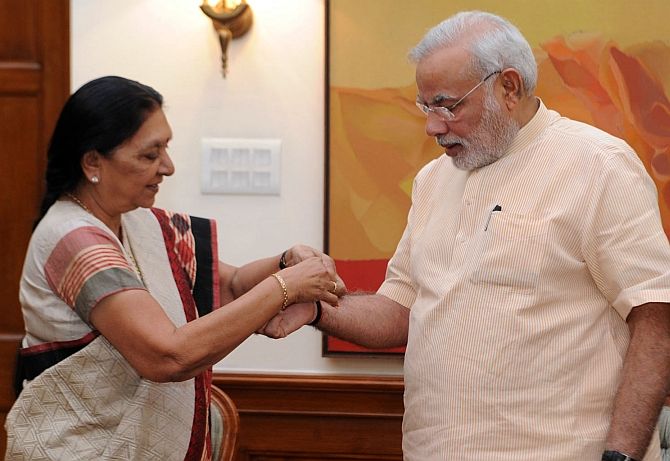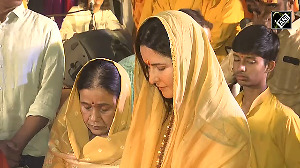Archis Mohan decodes Bharatiya Janata Party's pre-presidential poll manoeuvres.

The Bharatiya Janata Party-led National Democratic Alliance is currently short of nearly 66,000 votes in the electoral college that elects the President of India.
It hopes to bridge this deficit, partially, by winning a significant number of seats in the Uttar Pradesh legislative assembly. And, is banking on support of the All India Anna Dravida Munnetra Kazhagam to meet the remainder of the shortfall.
As part of this outreach, the Narendra Modi government is set to recommend Anandiben Patel’s name for the vacant gubernatorial post at the Chennai Raj Bhavan.
Currently, Maharashtra Governor Vidyasagar Rao has the additional charge of Tamil Nadu.
Patel is a trusted lieutenant of Prime Minister Modi, which makes her a suitable candidate to be the TN governor, to lead Modi government's outreach to the new CM there, Edappadi K Palaniswami, and his supporters.
Sources said Patel would be evidence of the Modi government's intent to iron out the rough spots that had cropped up between the Centre and the AIADMK after the recent leadership tussle in that party.
Patel had succeeded Modi as CM of Gujarat, when he had moved to Delhi as the country's prime minister after the 2014 Lok Sabha poll.
In August 2016, Patel quit when a month short of turning 75. She has waited in the wings ever since, while others like Najma Heptulla, dropped from the Union Cabinet as she had reached the age of 75 years, were rewarded with gubernatorial posts.
The President of India is elected by members of an electoral college that comprise elected members of the Lok Sabha and Rajya Sabha and elected members of all legislative assemblies.
Nominated members, whether of Parliament or legislative assemblies, are not included.
The value of an MLA's vote is based on the population census of 1971. Therefore, the value differs from state to state.
The value of the vote of a legislator from UP, with the largest population, is the highest at 208, while Sikkim’s is the lowest at seven.
The value of the vote of a Member of Parliament is 708. The total value of votes of the electoral college is 1.09 million.
Currently, the BJP has nearly 380,000 votes in the electoral college. To reach the halfway mark of 549,000, the party needs another 170,000.
The 102,000 votes of its NDA partners reduces this gap to around 66,000. This is where the UP assembly poll results, as well as outreach to potential supporters as the AIADMK is crucial.
The UP assembly, with 403 seats, contributes 83,824 votes to the electoral college. In the outgoing assembly, the BJP has 41 MLAs, a meagre 8,528 votes.
Its winning around 150 seats in UP would deliver the BJP 31,200 votes in the presidential electoral college, while 100 seats would get it to 20,800.
Top BJP strategists, including party chief Amit Shah, are confident that a good performance in UP would compensate for the likely losses the party and ally Shiromani Akali Dal could suffer in Punjab.
A victory in UP will also deflate Opposition morale and help Modi government strategists persuade fence sitters among the regional parties to vote for the ruling coalition's candidate.
This is where regional ruling parties as the Trinamool Congress, Biju Janata Dal and AIADMK are important. All three have significant numbers in Parliament and are ruling parties in their respective states.
The TMC has 63,721 electoral college votes; the BJD has 37,257. The AIADMK has 58,160.
A Modi government and Mamata Banerjee-led Trinamool rapproachment looks difficult at this juncture.
In Odisha, the BJP displaced the Congress as main challenger to Naveen Patnaik's government after last month's local body elections.












 © 2025
© 2025